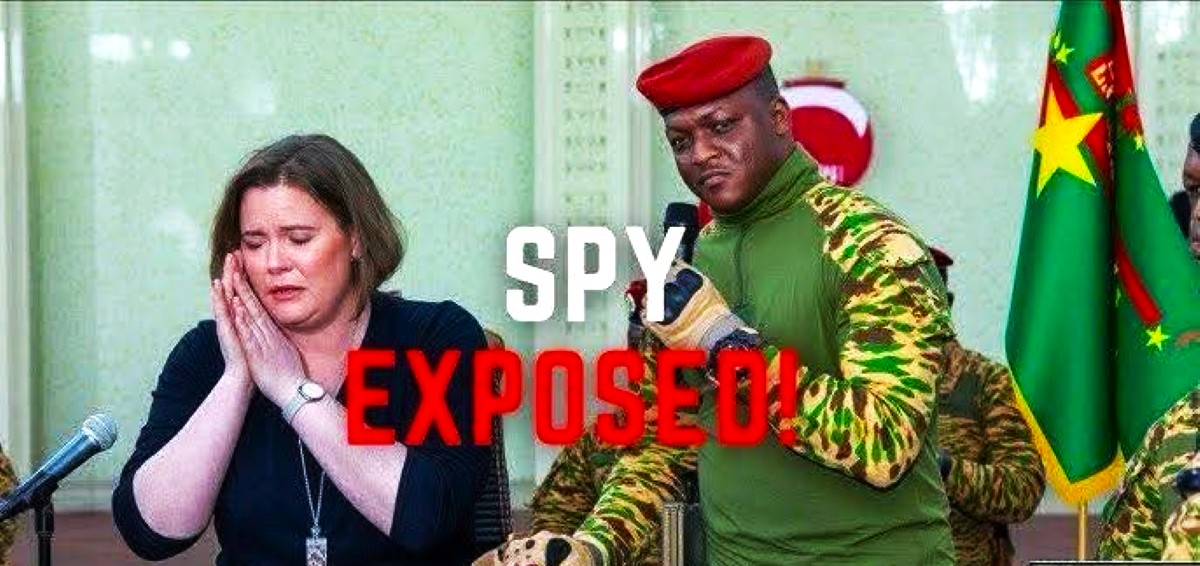Claire Dubois, a French woman in her early 30s, arrived in Burkina Faso posing as the director of a Non-Government Organization known as Forward.
Pretending to love the new Burkina Faso government and its leader, Dubois organization worked diligently to support girls’ education and women’s health in the country.
Dubois presented herself as a humanitarian focused on helping African women, visiting villages, schools, and markets, and praising Burkina Faso’s leadership on state television.
But wait, isn’t something missing here? Why is this new French woman striving so hard to look like she loved Burkina Faso so much?
It turned out that, behind her humanitarian NGO façade, Dubois had something sinister hidden in her closet. She was actually engaged in espionage.
The French woman was gathering intelligence on military sites, including military training centers, oil facilities, and drone monitoring posts, under the guise of humanitarian work.
She is reported to have carried two phones-one public and one for secure communication-and sent encrypted emails containing detailed maps and satellite images of sensitive military locations to contacts linked to the North Atlantic Treaty Organization (NATO) and foreign intelligence.
Burkina Faso’s intelligence services had already flagged her activities and monitored her communications.
As Dubois continued to act as she loved his leadership, President Ibrahim Traoré allowed her to continue to gather evidence of her true mission.
Eventually, Claire was publicly exposed at a National Conference on African Sovereignty, where the president presented her own classified documents and emails live on stage, revealing her spying activities to the world.
Ms Dubois was caught off guard by the exposure and later detained quietly by the government.
Despite diplomatic pressure for a quiet resolution, President Traoré insisted on transparency and justice, emphasizing the betrayal of trust involved.
More than fair share of spies in Ouagadougou
Burkina Faso authorities announced the arrest of nine individuals suspected of plotting to assassinate President Ibrahim Traoré, the revolutionary leader who has governed the West African nation since a peaceful takeover in September 2022.
According to a statement from the Ministry of Security, the suspects—described as a mix of foreign nationals and Burkinabé residents —were apprehended following intelligence reports of a “sophisticated conspiracy” aimed at destabilizing the government.
The ministry alleged that the group was planning a targeted attack to eliminate Traoré, whose leadership has polarized opinions due to his hard-line stance against insurgency and foreign influence.
“These individuals were caught with evidence of their intent to undermine our sovereignty and eliminate our leader,” the statement read, without disclosing specific details about the evidence or the identities of those arrested.
Authorities claimed the plot was orchestrated with external backing, though no countries or organizations were named.
Traoré, a 36-year-old army captain, rose to power after overthrowing his predecessor, Paul-Henri Sandaogo Damiba, citing failures to curb jihadist attacks that have plagued Burkina Faso for years.
His tenure has been marked by a shift away from traditional Western allies, notably France, and closer ties with Russia and other regional powers.
This realignment has drawn both domestic support and international scrutiny, fuelling speculation about motives behind the alleged assassination attempt.
The government has not provided a timeline for legal proceedings or further disclosures, but security forces have intensified operations across the capital, Ouagadougou, and other key regions.
Burkina Faso’s junta has faced multiple coup attempts and rumoured plots since Traoré’s rise, reflecting the fragility of its political landscape.
The country remains under a state of emergency as it battles insurgent groups linked to al-Qaeda and the Islamic State, which control swaths of territory in the north and east.
As investigations continue, the government has urged citizens to remain vigilant and report suspicious activities, signalling a new chapter in Burkina Faso’s turbulent struggle for stability.

